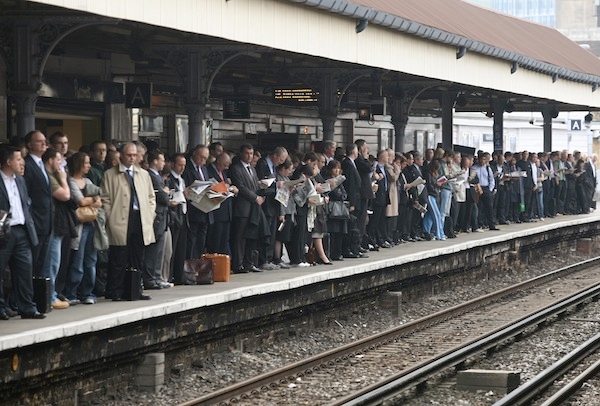Commuters spend more than a tenth of disposable income on annual rail season tickets, a BBC investigation has found.
Figures also show some commuters pay almost 40p per mile of railway while others pay 11p per mile. Campaigners for better railways said people were ‘astonished’ so much of their income was going on travel. Train operators say rail travel is better value for money than running a car. The Government said it had capped rail fares in line with inflation. Holidays British holidaymakers could be forced to pay for visas to travel to Europe as a trade-off for the Brexit vote, the Home Secretary has admitted. The Telegraph reports that Amber Rudd said she could not ‘rule out’ the introduction of a scheme which would force those from outside the EU to pay for visas. The plan, currently being considered by EU nations, emerged over the weekend and, on Sunday, Rudd suggested that Britain could be prepared to accept visas as a price worth paying during the Brexit negotiations. But she warned that the UK could retaliate and create a similar system if British citizens were hit with a charge to travel to countries like France and Spain. EconomyThe British Chambers of Commerce (BCC) has slashed its growth forecast for the UK in the light of the Brexit vote.
It now expects the UK to grow 1.8 per cent this year, down from its March estimate of 2.2 per cent, and by 1 per cent in 2017 compared with its original forecast of 2.3 per cent. Uncertainty surrounding the UK’s negotiations over its EU exit would ‘dampen growth prospects’, it said, while consumer spending would weaken. It said the UK ‘would skirt with’, but avoid, a recession. However, a separate report on business conditions from accountancy and services group BDO said optimism was improving, after falling to a three-year low last month. Housing Every privately owned home in London built before 2006 has risen in value by more than 50 per cent, while two million homes across the country have fallen in value, according to The Times. As Philip Hammond prepares a fiscal policy that promises to focus on housebuilding, research by Savills has highlighted the difficulty in implementing a nationwide housing policy. The research shows that between June 2006 and June this year, about 1.75 million, or 8 per cent, of all privately owned homes in England, Wales and Scotland fell in value, with 1.4 million of those being in the north of England. The average fall was 4.3 per cent, as many northern cities struggle to adapt to a post-industrial decline in the local economy. This is in contrast to London, where all 2.4 million privately owned homes have risen by more than 50 per cent in value over the past decade. Pensions Associated British Foods – the owner of Primark – has plunged to a £200 million pension deficit, according to the Financial Times. It reports that the group’s UK pension scheme has plunged from a small surplus this time last year to a £200 million deficit, which has resulted in ‘an increased service cost and a higher interest charge next year’. Since the UK voted to leave the EU, gilt yields have plunged amid expectations for lower economic growth and a splurge of stimulus from the Bank of England, causing the total UK pension deficit to balloon past £400 billion to a record high. In other pensions news, the Economic Secretary to the Treasury, Simon Kirby, has announced that a prototype of the Pensions Dashboard will be ready by March 2017. The Treasury has successfully secured agreement from eleven of the largest pension providers – Aviva, Aon, HSBC, LV=, NEST, Now: Pensions, People’s Pension, Royal London, Standard Life, Zurich and Willis Towers Watson – to build the first prototype of its kind in the UK. The Association of British Insurers has also agreed to manage the pilot project. The Pensions Dashboard is a platform that lets savers see all their pension pots in one place and will help them to plan for their retirement more effectively. On average, a person can have 11 employers over their working life, which means that they could end up with almost a dozen private pensions by the time they retire. Stamp duty The first new Welsh tax for almost 800 years is to be outlined in a bill expected to be introduced on Monday, The Guardian reports. The land transaction tax would replace stamp duty land tax from April 2018 if the bill becomes law. Like stamp duty land tax, land transaction tax would be payable on the purchase or lease of a building or land in Wales over a certain price. An announcement about the rates and bands for the proposed land transaction tax will be made closer to spring 2018, taking into account economic conditions at the time. CCJs A Daily Mail investigation has revealed that families are being financially crippled by county court judgements they knew nothing about. The Mail explains that banks, utility companies and parking cowboys are obtaining the judgements at an anonymous building in Northampton over alleged debts as small as 1p. Over the past two months, the Daily Mail has travelled the country speaking to people who have had CCJs obtained against them in their absence. Students Over half of students have lost personal belongings from their university accommodation according to new research by Sainsbury’s Bank Home Insurance. The most common items which have been lost include phones (44 per cent), jewellery (33 per cent) and clothes (28 per cent).





Comments